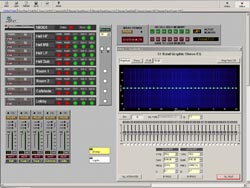Bosch's IRIS-Net V1.3 softwareMany of us have heard Andrew S. Tanenbaum's famous quote with regards to networking: "The nice thing about standards is that there are so many of them to choose from." Digital audio networking is no exception. In previous issues we explored the most popular "Licensed Standards" - CobraNet, EtherSound, and Dante. In this installment, we'll briefly explore Proprietary and Open standards. We also touch on why there is confusion in the industry with regards to networked audio.
Lots of Choices
It is hard to believe, but networked audio and paper towels have a lot in common. Before you eye-roll, have you been to the paper towel aisle lately? Neither had I until my wife expressed her stress in finding the proper paper towel in the sea of choices. It wasn't until I was sent "to buy our paper towels" that I understood-there are just so many choices!: Super absorbent vs. regular absorbent, prints vs. plain, 1/2 sheet vs. full sheet perforations, quilted vs. not, store brand vs. national brands... there must have been 45 different types of paper towels! All I wanted was a something to sop up my kids' spilt milk (and no marital strife from choosing the wrong one). Thus the installer is often in the same predicament, "All I want is audio from point A to B."
The good news is there are lots of choices. The bad news is there are lots of choices. In much the same way your paper towel choice is dictated by price, application, style, and personal preference, so too are your choices with digital audio transports. I wonder what kind of paper towel Tanenbaum's wife uses...

The SymNet 8x8 DSP is the original model in the SymLink series of network audio processors.
Proprietary Standard: Networking technology developed by a particular manufacturer for use with their products, and is not licensed to other manufacturers. The networking technology is not typically revenue generating, but instead an enabler of products of the manufacturer's specific closed system. Examples include Aviom's A-Net Pro16 in their Personal Mixers, Mackie's U-Net for their mic preamps and TT24 mixer, etc.
Open Standard: Networking technology developed and agreed upon by a standards organization such as the Institute of Electronic and Electrical Engineers (IEEE), Internet Engineering Task Force (IETF), or Audio Engineering Society (AES). This does typically imply "free", in that there are no licensing fees associated with the technology. This does not imply companies will not make money by manufacturing products that implement these standards. Examples include IEEE 802.3 (wired Ethernet) and 802.11 (wireless Ethernet), the IETF's STD 7 / RFC 793 (TCP - Transmission Control Protocol), and AES's AES10 (MADI - Multichannel Audio Digital Interface).
Author's Disclaimer:
Classification: To fend off the flame letters from manufacturers arguing about what type of standard they are, please refer to the definitions of these terms in the sidebar.
Order Table entries are listed in alphabetical order by the manufacturer's name.
Omission: Apologies in advance if your favorite transport / "standard" is not represented. See Tanenbaum's quote above for justification.
